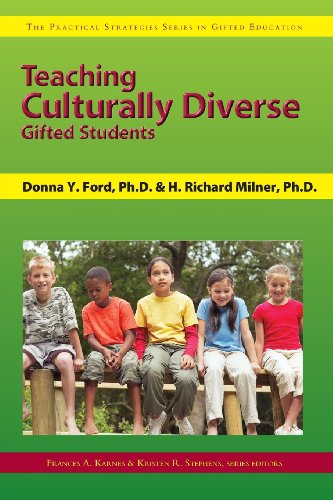The 21st century is witnessing an unprecedented change in its demographics, especially in school settings. Like no other time in history, our nation is becoming overwhelmingly diverse, with Hispanic Americans and African Americans increasing in numbers. However, as our nation and schools become more diverse, we have witnessed little demographic changes relative to diversity in gifted education classes, programs, and services.
This guide offers practical advice for building gifted education programs that serve a rich diversity of students. This book features an overview of multicultural gifted education, effective teaching strategies and best practices that support a diverse population of students, and an effective model for building a diverse, successful gifted program. The book also includes a sample curriculum and an extensive listing of print and Web-based recommended resources.
This is one of the books in Prufrock Press' popular Practical Strategies Series in Gifted Education. This series offers a unique collection of tightly focused books that provide a concise, practical introduction to important topics concerning the education of gifted children. The guides offer a perfect beginner's introduction to key information about gifted and talented education.
Donna Y. Ford, Ph.D., is a professor in the Peabody College of Education and Human Development at Vanderbilt University. She holds an appointment in the Department of Special Education and the Department of Teaching and Learning. Ford has been a professor of special education at the Ohio State University, an associate professor of educational psychology at the University of Virginia, and a researcher with the National Research Center on the Gifted and Talented. She also taught at the University of Kentucky. Ford earned her doctoral degree in urban education (educational psychology), master's degree (counseling), and bachelor's degree in communications and Spanish from Cleveland State University.
Dr. Ford conducts research primarily in gifted education and multicultural/urban education. She is highly published and has a extensive line of scholarship. Specifically, her work focuses on closing the achievement gap in five major ways: (a) recruiting and retaining culturally different students in gifted education, (b) developing multicultural curriculum and instruction, (c ), reversing underachievement among gifted Black students, (d) increasing Black family involvement, and (e) developing culturally competent educators. She consults with school districts and educational organizations nationally, and serves in several leadership roles in both gifted and urban education.
H. Richard Milner IV is the Helen Faison Endowed Chair of Urban Education and Professor of Education at the University of Pittsburgh. Milner earned his Ph.D. from The Ohio State University in Curriculum Studies. His research interests concern teachers' influences in students' opportunities to learn and academic achievement and persistence among African American students.
